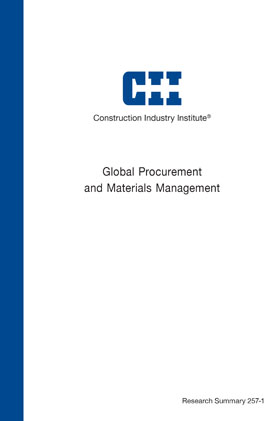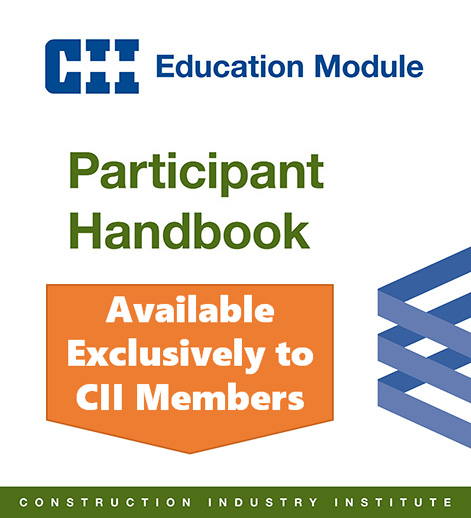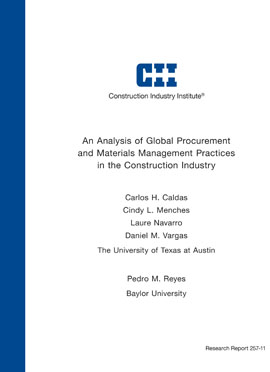
Global Procurement and Materials Management
Materials management is a complex and comprehensive process involving people, organizations, technologies, and processes that manage the definition, sourcing planning, quantification, supplier qualification, purchasing, supplier QA/QC, expediting, transportation, logistics, and control of materials and associated information across the life cycle of a capital project. Materials and related services account for a large percentage of a capital project’s total installed cost (TIC). Implementation of a comprehensive materials management program contributes to predictable project outcomes, reduced costs, improved productivity and quality, and a safer working environment. Such factors make the study of the materials management process crucial for project success.
CII first developed Special Publication (SP) 4, Project Materials Management Handbook, in 1989 to describe this process. In 1999, this handbook was superseded by an updated overview of materials management, Implementation Resource (IR) 7-3, Procurement and Materials Management: A Guide to Effective Project Execution. Over the past decade, materials management concepts and techniques have continued to evolve, and global conditions have changed. The primary purpose of the research described in this document was to update IR 7-3 to reflect the current effective practices in this field. To accomplish this goal, Research Team 257 undertook an extensive literature review, two surveys, and nine case studies. Prominent subject matter experts were also consulted. A total of 54 of the 97 major construction organizations queried took part in the team’s surveys and case studies; such high participation confers credibility on the study’s results and conclusions.
The implementation resources developed by the team provide specific guidelines, processes, and recommendations for the implementation of an effective materials management program, based on current industry practices. They also examine enabling technologies, management organizational structures, and emerging issues that have an impact on materials management programs. In the process of updating the materials management handbook, the team decided it would be more useful as an electronic tool—an e-guide through which the user can easily navigate to important information through hyperlinks and bookmarks. Current and foreseen issues affecting global procurement and materials management were also investigated. This publication summarizes the results of these research effort.
The research clearly shows a dramatic increase in the maturity, formality, and systematization of materials management by CII member organizations. Globalization is now well established and complex, presenting both opportunities and challenges. And, while IT systems that are designed for materials management will continue to improve real-time coordination and course correction for projects, these systems require better integration. Given the increasing size, variety, and complexity of global projects, materials management will maintain and expand its role in the early phases of capital project planning.
Most construction-related organizations have a structured procurement, or materials management department. (RS257-1, p. 5) CII surveys indicate a growing trend in the use of materials management systems by owners and contractors.
The majority of organizations reported regularly outsourcing Transportation and Logistics, Supplier Quality Management, Purchasing, Expediting, and Site Material Management. A properly developed and executed transportation and logistics plan will substantially increase the likelihood of timely delivery of the materials a project construction team needs.
Post-9/11 requirements have forced organizations to increase their resources for managing import/export compliance. A majority of respondents have a dedicated trade manager and maintain up-to-date procedures for import/export compliance. Owners feel that they have a mature import/export compliance system in place, while contractors do not.
The most significant changes in materials management in the previous 10 years are: improved technology, globalization, emergence of mega-projects, increased material costs and lead times, scarcity of materials and job space, and an increase in focus on quality and financial standards.
The growing size and complexity of projects appear to affect owners and contractors significantly. Workforce training, experienced personnel recruitment, and extensive risk assessment are measures organizations have adopted to address this issue.
Half of the respondents include the materials management IT system in their corporate strategy. However, the lack of interoperability of different systems and lack of access for external parties appear to be roadblocks to efficient IT implementation. It was indicated that additional training would increase the benefits from IT improvements.
Materials management will maintain and expand its role in the early phases of capital project planning. This increased early involvement is particularly important under any market condition, whether in periods of supply scarcity and global demand surge or in economic downturns.
About half of the survey respondents are seriously concerned with strategic supplier relationships, agreements through which strategic partners engage in long-term commitments and may share confidential information.
Table 101 (RS257-1, p. 71)



